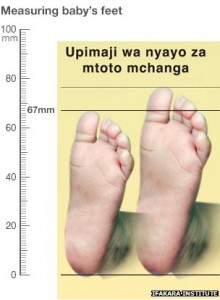by Ben Taylor
Tanzania meets child mortality target
A recent report from the United Nations estimates that the under-five mortality rate has dropped by two-thirds between 1990 and 2012 – from 166 to 54 deaths per 1000 live births. This puts Tanzania among a select few countries in sub-Saharan Africa to have met the Millennium Development Goal no. 4, along with Ethiopia, Malawi and Liberia.
Progress on related measures has also been good. On Infant mortality (deaths at under 12 months), the number of deaths per 100 live births has dropped from 101 in 1990 to 38 in 2012, and the neo-natal mortality rate (deaths in the first 28 days of life) has halved from 43 to 21 per 1000 live births in the same period.
An initiative reported by the BBC aims to help identify premature babies, since in rural Tanzania about one in every 30 premature babies will not survive beyond four weeks. “There’s this grey area when the baby is between around 2.4kg (5lbs 5oz) and 2.1kg (4lbs 10oz) when the baby is more vulnerable to infection and other issues,” says Dr Joanna Schellenberg of the London School of Hygiene and Tropical Medicine, “But when a baby is born at home, there is no way of weighing them”.
To help solve this problem, Schellenberg and her colleagues at the Ifakara Health Institute have implemented a strategy called Mtunze Mtoto Mchanga (“protect the newborn baby”). Based on research into baby foot lengths carried out in Lindi and Mtwara, the newborn baby’s foot is compared against a laminated card. If the foot is smaller than the small foot (67mm), the mother is advised to take the baby to hospital immediately. Babies with foot size in the medium range are advised to take extra precautions such as carrying the baby “skin-to-skin” so that the mother’s warmth is shared by the baby. The project relies on volunteers to measure the babies and help educate mothers, and WHO estimate that 75% of deaths in preterm infants can be prevented in this way – without the cost and emotional upset of intensive care.
Heart treatment centre
A new ultra-modern Cardiac Treatment and Training Centre has been opened at Muhimbili National Hospital in Dar es Salaam. The facility cost $20m to build, shared between the Tanzanian and Chinese governments.
The government has paid for 326 people to go for heart surgery abroad, at a minimum cost of $10,000 for each case. The new centre should be able to deal with the majority of such cases locally at much lower cost.
Improved malaria testing
The Ministry of Health and Social Welfare will make malaria Rapid Diagnostic Test (mRDT) equipment available in both government and private health facilities. The Minister said that the equipment gives faster and more reliable results than microscopic tests.
The scheme, which has been introduced by the Clinton Health Access Initiative and the National Malaria Control Programme, reduces the cost of the equipment from TSh 9,000 to TSh 1,100. (Citizen)

